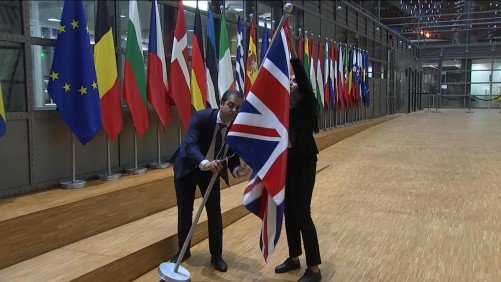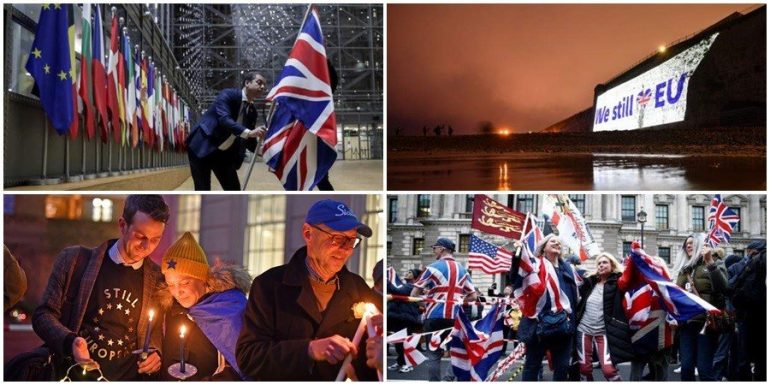After 4 years of discussions, disagreements and the inability to reach an agreement, Britain's exit from the European Union became a reality.
European institutions have already begun to hoist the British flag over its mast, starting at the European Council building in Brussels.
Two officers, a man and a woman, took less than a minute to lower the flag, fold it and leave without comment.
British flags will also be flown at the European Parliament in Strasbourg and Brussels by midnight (Brussels time).

The Presidents of the European Council, the European Commission and the European Parliament hailed "a Europe at the dawn of a new era", reminding the UK that it was losing the privileges of the post-Brexit Member State in a joint letter published today, the day of Britain's departure. .
Charles Michel, Ursula von der Leyen and David Sassoli have said they are ready to forge a new alliance with Europe's British neighbors.
"For us ..., as for so many others, today will inevitably be marked by thoughts and mixed emotions," they admit.


As a period of negotiations opens on the future of the European Union's relationship with London, the three European officials warn that "unless there are parity terms in the fields of environment, labor, taxation and government subsidies, there will be no broad access ( United Kingdom) in the single market ".
"One cannot retain the privileges that accompany (EU) membership when one no longer has that status," they recall.
The European Commission will negotiate the post-Brexit relationship from the beginning of March until the end of the transition period at the end of 2020.

"Although no longer an EU member, the United Kingdom will continue to belong to Europe. "Our common geography and history, as well as our ties in so many areas, inevitably unite us and make us natural allies," the three officials said.
After Brexit, "the Member States of the European Union will continue to join forces and build a common future… No country alone can stop the evolution of climate change, find solutions for the digital future or "she makes her voice heard amid the growing world-wide cacophony," the three officials warned.
"The European Union will continue its work as soon as the sun rises tomorrow morning," they conclude.

A "marriage" with a long history of crises
Brexit, Britain's "divorce" from Brussels, which is finalized tonight after more than three and a half years of postponement, is part of a long series of crises in EU history.
“Empty chair”
From 1 July 1965, France provoked the crisis of the "chair leave", refusing to participate in the Community institutions for seven months after a controversy over the financing of the Common Agricultural Policy (CAP).
France was also at the center of another crisis, with General de Gaulle vetoing Britain's accession in 1963 and then in 1967, delaying its accession until 1973.
"I want my money back"
Since 1979, British Prime Minister Margaret Thatcher has insisted on a reduction in her country's contribution to the European budget, repeating the phrase: "I want my money back". He will succeed in 1984.
The Danes reject Maastricht
On June 2, 1992, the Maastricht Treaty was rejected by the Danes in a referendum. After securing exceptions, mainly for the euro and European defense, the Danes approved the text in a new referendum on 18 May 1993. The treaty was adopted by the French.
Resignation of the Commission in 1999
On 16 March 1999, the European Commission resigned en masse following an overwhelming report denouncing its "heavy liability" in fraud cases.
Sanctions against Austria
In February 2000, the EU imposed sanctions on Vienna following the entry into the Austrian government of a far-right party, the FPÖ, for the first time in the EU. Bilateral relations between 14 other countries and Austria have been frozen for months.
On December 16, 2017, the FPÖ re-enters the government, this time without provoking the Brussels mines.
Failure of the European Constitution
On 29 May 2005, after nine ratifications without obstacles, France rejected the draft European Constitution. On June 1, the Dutch do the same. The text will be buried, but will be implemented in part through the Lisbon Treaty, which will enter into force at the end of 2009.
Greek debt
In 2009 Greece's fiscal debt is revised upwards. The country is threatened with a moratorium on payments and Europe fears a "Grexit". Since 2010, Greece has been the subject of many international rescue plans, subject to strict austerity, sparking large-scale demonstrations as the country sinks into recession for years.
The debt crisis is also affecting Ireland, Spain, Portugal and Cyprus.
Immigration crisis
The arrival in 2015 of more than one million people by sea on the Greek and Italian coasts is disturbing the EU, which is divided between closing the border and showing solidarity with those seeking asylum to escape the war, especially in Syria. More than 19.000 are estimated to have lost their lives trying to reach Europe since 2014.
Hungary, Poland and the Czech Republic categorically refuse to implement a redistribution plan for asylum seekers arriving in Italy and Greece, which will deeply divide Europeans.
Brexit
On 23 June 2016, the United Kingdom becomes the first member state to decide to leave the EU following a referendum. Thorny negotiations begin with the aim of a "divorce" on March 29, 2019.
A first draft agreement reached with Brussels by British Prime Minister Theresa May has been rejected three times by the British Parliament, causing several postponements of the Brexit date.
May's successor to the UK Prime Minister, Boris Johnson, reaches a new agreement with Brussels in mid-October 2019. Following a new Brexit adjournment to 31 January 2020, he wins a majority in parliament and achieves ratification of its agreement with Brussels on the eventual withdrawal of Britain from the EU.

What will change after Brexit
Daily trade between Britain and the EU will continue unchanged until 2020. During the 11-month transition period, London and Brussels will negotiate their future relationship. However, from February 1, there will be some practical changes.

Fewer inhabitants
At midnight on Friday, the EU will lose for the first time one of its member states, which is one of the richest and largest in the Union.
With a population of 66 million, the EU will shrink to around 446 million. Its territory will be reduced by 5,5%.
If Britain ever decides to return to the EU, it will have to follow the accession process normally.

Changes at the institutional level
Outside the European Parliament building the British flag will be lowered and this is what will symbolize the real change. After leaving the EU, Great Britain will become a "third" country.
None of the 73 British MEPs elected in May 2019 will return to Strasbourg. 46 of their seats will be reserved for the new Member States and 27 will be redistributed to other countries.
London will no longer have the right to nominate a European Commissioner.
The British Prime Minister will not be invited to the European summits, while the members of the British government will not participate in the ministerial conferences.
As third-country nationals, Britons will no longer be able to work in European institutions. Many of them have already received dual citizenship in order to remain in office.
Instead, Britain will continue to pay the money provided in the EU budget until the end of the transitional period.

Citizens' rights on both sides of the English Channel
According to the UN, more than one million Britons live and work in EU countries, mainly in Spain, France, Ireland and Italy. According to the British Statistical Office, 2,9 million people from the 27 EU countries live in Britain, which represents 4,6% of the population.
Under the departure agreement, people who have settled on both sides of the English Channel before the end of the transitional period will retain the right to live and work in the host country.
European citizens living in Britain will have to register to be eligible. For Britons living in the EU, the procedures vary from country to country.
Freedom of movement will be valid until the end of December 2020.

The timing of the negotiations
The United Kingdom will leave the EU on 31 January 2020, a date that has been postponed three times since June 2016, when the referendum took place.
The UK will enter a transitional phase with its relations with the EU remaining unchanged until 31 December 2020. The aim of the deadline is to allow Brussels and London to form a new relationship in the field of security and especially in the field of trade.
London says it is ready to start negotiations on February 1, but Brussels is in talks to set the goals of the negotiations.
The European negotiating mandate is expected to be approved at ministerial level by 25 February, according to European officials, which will allow negotiations to begin around 1 March.
Apart from trade, there is no shortage of issues for the United Kingdom and the 27 to agree on: security, judicial cooperation, education, energy;
At the same time, London plans to start negotiations with other countries, led by the United States, to reach free trade agreements.
The UK has the right to request an extension of the transitional period for one or two years, but this must be done by 1 July 2020. The British Prime Minister has ruled out this, but the Commission considers that the period is not enough.
On 31 December, the transitional period will end with it, ending the 47-year-old ties between the United Kingdom and the EU.
If no agreement is reached within the transition period, the naughty Brexit will be a one-way street and, among other things, trade and transport are at risk of major disruptions.

Boris Johnson sees a "historic opportunity" for Britain after Brexit
The British Prime Minister will call on the British people to embrace this "historic opportunity" as the country is officially getting a divorce from the EU today after 47 years.
In a speech to the nation, Johnson is expected to ask the British to help him "unleash all the dynamics of the country and raise the level of the whole of the United Kingdom," Downing Street said.
Thousands of Eurosceptics are expected to celebrate Brexit Day in London and other British cities, but most Britons have no plans to do so.


Source: sigmalive
